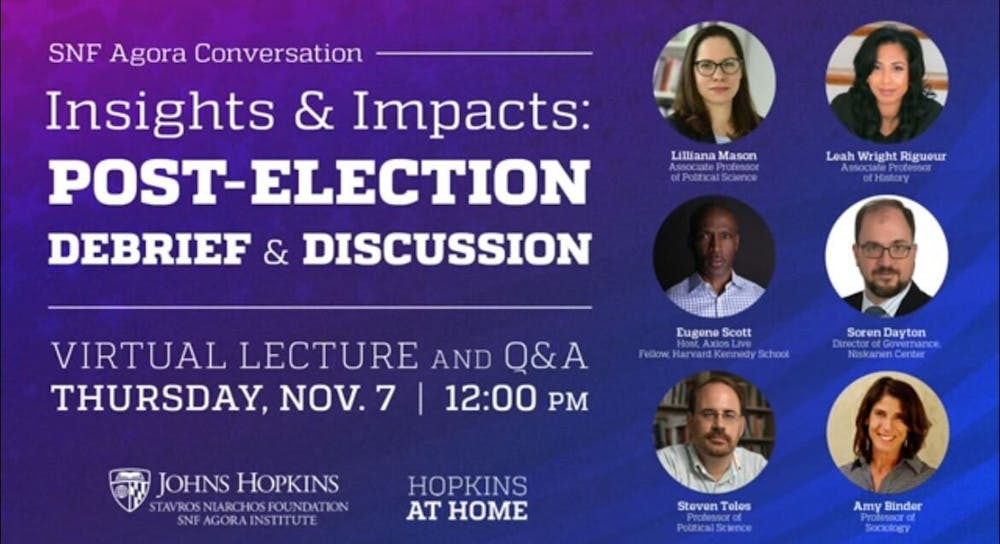Hopkins at Home and the Stavros Niarchos Foundation (SNF) Agora Institute hosted a virtual event titled “Insights & Impacts: Post-Election Debrief” on Thursday, Nov 7. The two-part discussion from Hopkins faculty and alumni analyzed the election outcome of the 2024 U.S. general election and its future implications.
The event began with a discussion moderated by Steven Teles, a professor of political science and senior fellow at the Niskanen Center. Joining him were Leah Wright Rigueur, an associate professor of history and an expert in presidential elections and 20th-century U.S. political history, and Lilliana Mason, an associate professor of political science specializing in partisan identity and American polarization. Together, they compared their pre-election expectations with the actual results.
Reflecting on her prediction, Rigueur revealed that she had anticipated a Trump victory, a view she shared despite opposition from her students.
“I said, [before the election], I would give the edge to Donald Trump, and I think a lot of [my students] were shocked by that,“ she said. “A woman — a Black South-Asian woman — candidate becoming the nominee and only having 107 days to prepare around this economy after an incumbent steps down makes us think this is a Trump victory.”
Despite her forecast, Rigueur noted several surprising outcomes, especially in battleground states and in the popular vote.
“I did not think Trump would win the popular vote, and I didn’t realize Harris would lose Pennsylvania. Even in hard blue states like New York, Maryland and Connecticut, there was a rightward switch amongst the American electorate,” she added.
Rigueur attributed these unexpected results to economic concerns and reactions to the Israel-Hamas conflict.
“We currently have the best economy in the world, but there is a real disconnect with how people feel it in their day-to-day lives... In Michigan, the heavy Arab and Muslim population criticized the way the Biden Administration handled the Gaza conflict,” she said.
She also highlighted the role of grievance politics, noting that Harris’ campaign, representing institutional stability, clashed with an anti-institutional era. Rigueur explained how she believed that Trump built a diverse coalition driven by populist grievances, channeling his own frustrations into a message that struck a chord with many Americans. Meanwhile, Harris appeared aligned with institutional authority and expertise, which clashed with widespread skepticism about experts and their perceived overconfidence.
Mason contextualized these results within global political trends, pointing to anti-incumbent sentiment and populist movements gaining traction in response to an uncertain economic climate and pandemic-era frustration.
“We’ve seen a real rejection of incumbents all over the world. Everyone is also still trying to process the fear of uncertainty [due to inflation] and the trauma from the pandemic. When we are uncertain, we tend to go towards a strong-man leader,” she said.
She also noted that the Biden administration's failure to emphasize its achievements allowed Trump’s campaign to shape a dominant narrative.
“[Voters] really complained that Harris’ campaign and the Biden administrations so very rarely touted their economic, climate change and infrastructure accomplishments,” she added. “This allowed the other side to create a narrative around these accomplishments that didn’t necessarily live up to the truth.”
The discussion closed with both Rigueur and Mason stressing the importance of public engagement in counteracting misinformation.
“Given how people get their information [on social media], particularly with the development of AI, we must continue with the culture of misinformation, but we can actually get out there and talk and engage with people in real life if we want to hold them to our side,” Rigueur remarked.
The event then transitioned into a discussion between Soren Dayton, director of governance at the Niskanen Center, and Eugene Scott, a host at Axios Live and fellow at the Harvard Kennedy School, moderated by Teles. They discussed the broader implications of the election’s outcome, including shifts within the Republican Party and the potential impacts on governance.
Scott highlighted the GOP’s strengthened relationship with working-class voters, including Black and Latino workers.
“The Republican party is now very confident in their standing with working-class votes, including Black and Latino workers that are disproportionately part of the working class,” he said.
Dayton predicted that this demographic shift could lead to an economic populist agenda within the GOP.
“One of the questions people must wrestle with is, what policies do Republicans have to give to their economically downscaled voters that are the base of their party... Vance’s presence in the White House will certainly mean a populist economic argument will have more power,” he added.
He also pointed out the challenges the GOP faces in balancing Trump’s extreme policies with internal divisions.
“The reality is that [Trump’s] not a king... Republican lawmakers, including Republicans who support him, not only have to work with Democrats, but also they have to work with each other... There are a lot of different wings in the GOP who think this victory means different things,” Dayton added.
The conversation wrapped up with Scott and Dayton discussing anxieties over the administration’s impact on funding, particularly in areas like scientific research, as well as potential effects on the Hopkins community.
Dayton highlights widespread anxiety, particularly regarding potential cuts to scientific research funding. However, he remains confident this will not materialize, emphasizing that scientific research and development are vital drivers of growth for both the American people and the economy.
“There’s a lot of anxiety going around, but I have trouble seeing a world where there is a massive cut to [scientific research], as it’s a source of growth,” Dayton noted.
Scott concluded by advising against assuming worst-case scenarios for every policy initiative.
“It’s also very unlikely to see long-term projects due to Trump changing roles depending on his attitudes... I want to encourage people to not assume the worst will happen every single time. There will be a lot of promises that he made that will not come to pass,” he concluded.





